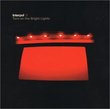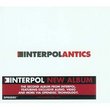| All Artists: Interpol Title: Our Love to Admire Members Wishing: 2 Total Copies: 0 Label: EMI Europe Generic Release Date: 6/3/2008 Album Type: Import Genres: Alternative Rock, Pop, Rock Styles: Indie & Lo-Fi, New Wave & Post-Punk Number of Discs: 2 SwapaCD Credits: 2 Other Editions: Our Love To Admire [CD/DVD] UPC: 5099951932527 |
Search - Interpol :: Our Love to Admire
 | Interpol Our Love to Admire Genres: Alternative Rock, Pop, Rock
Our Love To Admire is at once unmistakably Interpol and undeniably new. The witty and perverse "No I In Threesome" is an upbeat ode to shaking up a staid relationship propelled by Carlos D's peerless bass melody while the ... more » |
Larger Image |
CD DetailsSynopsis
Amazon.com Our Love To Admire is at once unmistakably Interpol and undeniably new. The witty and perverse "No I In Threesome" is an upbeat ode to shaking up a staid relationship propelled by Carlos D's peerless bass melody while the tenderly observant "Pace Is the Trick" proves that the band are still the masters of the dramatic ? check the painful pause right before the sinfully satisfying return of Sam's thundering drums and Daniel's ringing lead guitar. The band's impressively seductive evolution is obvious all over the record, but never more so than on tracks like "Mammoth," "Who Do You Think" and on the album's lyrical centerpiece, the ghostly "Rest My Chemistry." While Daniel is understandably proud of the song he cautions against reading too much autobiography into its lyrics. "We always leave the interpretation to the listener," he says. "I mean, you shouldn't watch a movie for the first time listening to the director's commentary!" Our Love to Admire closes with "The Lighthouse," a funereal dirge that is among the most unexpected and memorable songs ever recorded by the band. Almost entirely percussion-free, the song is constructed around Daniel's mournful guitar and Paul's sparten lyrics. Not only is it one of their finest moments to date, it provides the album's most goose-bump inducing moment, the very same reflex shivers that make Interpol live shows such an exhilarating experience. As the very last song the band recorded for the album it was, they say, the hardest to play. The hypnotic guitar part was played on a 50-year-old guitar that had toxins on the strings, providing Daniel with a blistering and painful sensation in his fingers. The band weren't even sure the track would make it out of the studio, but once they heard Paul's remarkable vocals they were floored. The song ? and the album ? doesn?t so much end as it bleeds to a close with a long, echoey coda filled with feedback and strings. A fittingly dramatic end to a stunning and emotional journey. Interpol is back, every bit as good as before but charged with a new spirit, a new direction, a new label and, most of all, a new confidence. Similar CDs
|
CD ReviewsA FEW NEW DIRECTIONS, BUT STILL INTERPOL AT THEIR FINEST (4 Cary S. Whitt | Columbus,Ohio USA | 07/10/2007 (4 out of 5 stars) "I have the joy in announcing the new Interpol album is as good as I hoped it would be. In fact it does exactly what it needs to do. It sounds like Interpol, it's got some great lyrics, and it timidly breaks into some new directions. Our Love To Admire is another step forward for the NYC band without abandoning the familiar waters in which they sail. I'll spare the Joy Division comparisons because after 3 records, that has gotten very old, and quite frankly it's a label not all that appropriate anymore. Sure, Paul Banks' voice still has the Ian Curtis gloominess about it, but musically I think Interpol have gotten more adventurous and playful on Our Love, and in some ways, much stronger for it. Again, this doesn't mean the band stray far from the formula, Our Love To Admire is a sweeping ode to relationships and the personal struggles that come with them. The album starts off somewhat more experimental before settling in, but after a few listens, this start, particularly Pioneer of the Falls, might be one of the key moments of the entire disc. Nearly 6 minutes in length, Pioneer of the Falls sounds as if we are witnessing a funeral of sorts, with all kinds of subtle sonic rumblings going on. It's not over the top mind you, but it's enough to evoke a new and emotional starting point for the new material. A stunning start. The first single, The Heinrich Maneuver, is an up-tempo jab to an ex-love now residing on the opposite coast, it's fun and as accessible as Interpol can be. As always, Carlos D's commanding bass lines carry the single, and in many ways, anchor the whole of the record. More familiar footing can be found in, `No I in Threesome' which is about (obviously enough) someone trying resurrect a dying love affair with ways to spice things up. In it, Paul playfully sings, "maybe it's time we give something new a try". The result, both sonically and lyrically, is a relentless and interesting view of love and how certain people may handle the harder times. Mammoth, the album's dynamic fifth track, attacks the ears with Daniel Kessler's simple, repeated guitar riffs that fans may feel echo early work like C'Mere or PDA (not a bad thing at all). More ambient numbers are also present as well. The eerie, The Lighthouse, has Bank's crooning in a way that it almost turns into spoken word, it's strange and affecting. The subtleness of Interpol's maturation and evolution as a band is more obvious in tracks like, Who Do You Think, Pace Is the Trick, and Rest My Chemistry. All have an underlining new spirit and fervor reserved for bands making drastic changes to what they do best. Not the case here, Interpol have employed these changes with the expected precision we've come to admire from them. And even with all the expected underpinnings, the band has grown perfectly into what they do. Fully realized, Our Love To Admire is more ambitious and more rewarding than their first two releases combined, and for me, that's speaking volumes. One only has to look upon to new (and great) art direction they've added to visual represent the change in the band's direction and growth found within." Hoping for more C. Morrison | Bay Area, CA | 07/29/2007 (3 out of 5 stars) "Having been a big fan of the first two albums, and seeing them a couple of times in concert, I eagerly anticipated the latest release from Interpol. However, I find my self disappointed with the new album, not so much because I feel it is a bad album, but because after listening to it 5 times, I would be hard pressed to talk of any songs that grabbed my attention. I couldn't even start to hum a few bars of anything on it, and that is just so not Interpol. Pioneer to the Falls, The Heinrich Maneuver and Rest My Chemistry sound like they would have fit in nicely with either of their first two albums, but neither would have been stand outs. Not that they are bad songs, they just don't grab you and pull your soul into the song like a good portion of their previous work would do. For now, Our Love to Admire will sit in the drawer. I'll probably go see them in concert when they swing by, in hopes that their stellar live show will turn my opinion of the new material. Until then I'll throw on Turn on the Bright Lights and enjoy Interpol's past brilliance." My Two Cents R. Johnson | Portland, OR United States | 07/30/2007 (5 out of 5 stars) "It is my opinion that with Our Love to Admire Interpol has returned to the subtlety of Turn on the Bright Lights, and is a better album than Antics. I owned Bright Lights for almost a year after it came out before I really listened to the album and came to appreciate it. This was partly due to how different it was from all the other music on the radio, with its eccentric lyrics and subtle musicality. You really needed to pay attention while listening to value it (at least I did). It is now one of my all-time favorites.
When Antics was released, I listened to it the first time and felt like I "got it," meaning it was in a similar vein as Bright Lights but lacked the nuance that had rewarded close listening. It's a good album, but not great. The first time I heard the new album I wasn't blown away. But I did hear some of the seeds of what had made Bright Lights so remarkable, and I stuck with it. After listening to it for a few weeks, I have to say I think Our Love to Admire is a great album. I won't do a song by song thing, since that has already been done by other reviewers. Basically, the whole record is full of little surprises and clever touches that make listening to it sort of like trying to complete a puzzle or a crossword: you're listening to a song that you've heard a dozen times before when something pops out at you from the bass line or the percussion and totally changes the shape of the song. It is that kind of detail that makes Interpol such a great band, and it really comes through on this album. " |

 Track Listings (11) - Disc #1
Track Listings (11) - Disc #1










